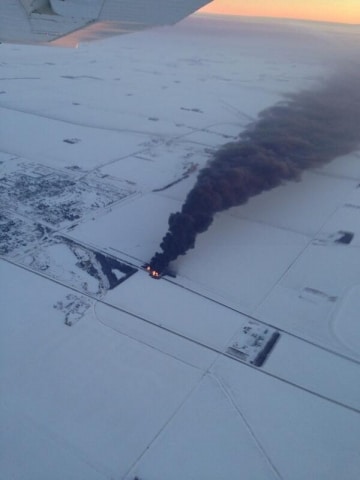On January 2, the Pipeline and Hazardous Materials Safety Administration (PHMSA) issued a major safety alert, declaring oil obtained via hydraulic fracturing (“fracking”) in the Bakken Shale may be more chemically explosive than the agency or industry previously admitted publicly.
This alert came three days after the massive Casselton, ND explosion of a freight rail train owned by Warren Buffett‘s Burlington Northern Santa Fe(BNSF)and was the first time the U.S. Department of Transportation agency ever made such a statement about Bakken crude. In July 2013, another freight train carrying Bakken crude exploded in Lac-Mégantic, vaporizing and killing 47 people.
Yet, an exclusive DeSmogBlog investigation reveals the company receiving that oil downstream from BNSF — Marquis Missouri Terminal LLC, incorporated in April 2012 by Marquis Energy — already admitted as much in a September 2012 permit application to the Missouri Department of Natural Resources (DNR).
The BNSF Direct ”bomb train” that exploded in Casselton was destined for Marquis’ terminal in Hayti, Missouri, according to Reuters. Hayti is a city of 2,939 located along the Mississippi River. From there, Marquis barges the oil southward along the Mississippi, where Platts reported the oil may eventually be refined in a Memphis, Tennessee-based Valero refinery.
According to Marquis’ website, its Hayti, Missouri terminal receives seven of BNSF Direct’s 118-unit cars per week, with an on-site holding terminal capacity of 550,000 barrels of oil.
Marquis was one of many companies in attendance at a major industry conference in Houston, Texas in February 2013, called “Upgrading Crude By Rail Capacity.” Its September 2012 Missouri DNR permit application lends additional insight into how and why BNSF‘s freight train erupted so intensely in Casselton.
“Special Conditions”
Rather than a normal permit, Marquis was given a “special conditions” permit because the Bakken oil it receives from BNSF contains high levels of volatile organic compounds (VOCs), the same threat PHMSA noted in its recent safety alert.
Among the most crucial of the special conditions: Marquis must flare off the VOCs before barging the oil down the Mississippi River. (Flaring is already a highly controversial practice in the Bakken Shale region, where gas is flared off at rates comparable to Nigeria.)
It’s a tacit admission that the Bakken Shale oil aboard the exploded BNSF train in Casselton, ND is prone to such an eruption.
“Hazardous Air Pollutant (HAP) emissions are expected from the proposed equipment,” explains the Marquis permit. “There will be evaporative losses of Toluene, Xylene, Hexane, and Benzene from the crude oil handled by the installation.”
Benzene is a carcinogen, while toluene, xylene and hexane are dangerous volatiles that can cause severe illnesses or even death at high levels of exposure.
Scientific Vindication
In a December 31 Google Hangout conversation between actor Mark Ruffalo, founder of Water Defense, and the group’s chief scientist Scott Smith, Mr. Smith discussed the oil samples he collected on a previous visit to North Dakota’s Bakken Shale.
“What I know from the testing I’ve done on my own — I went out to the Bakken oil fields and pumped oil from the well — I know there are unprecedented levels of these explosive volatiles: benzene, toluene, xylene,” said Smith.
“And from the data that I’ve gotten from third parties and tested myself, 30 to 40 percent of what’s going into those rail cars are explosive volatiles, again that are not in typical oils.”
Subscribe to our newsletter
Stay up to date with DeSmog news and alerts






